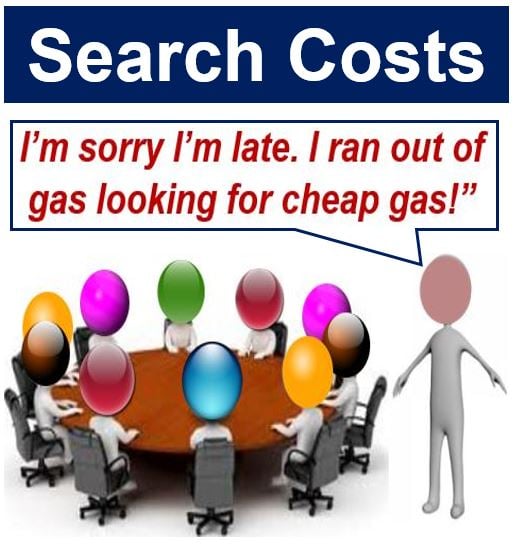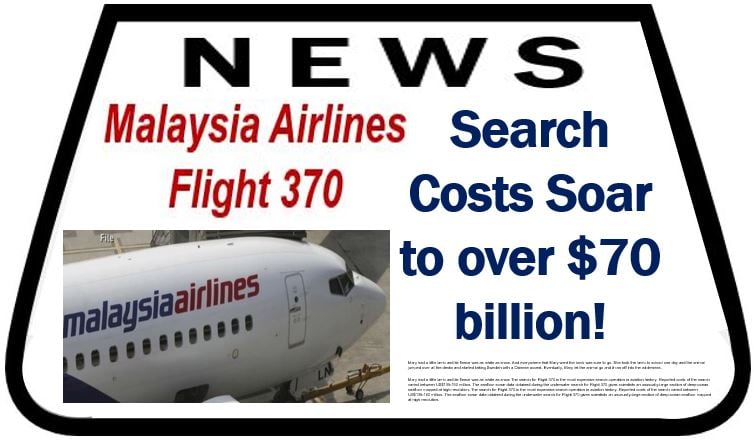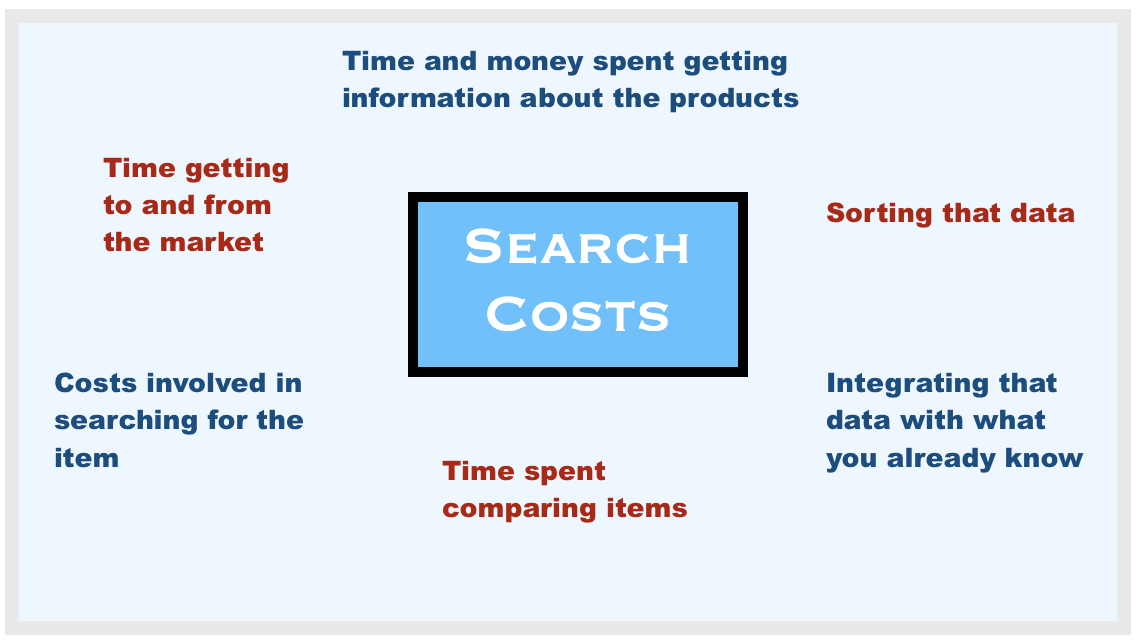Search costs are those related to finding what we want. When we purchase something, the economic cost is more than just the price we pay for it.
Searching for what we want, finding it, and making sure that it is selling at a competitive price, comparing its features with those of rival products, is time consuming and expensive.
There is a cost to getting to the market place, plus the opportunity cost – the time we spend fact-finding.
The lower the search cost, the easier it is for us to obtain product information. Search costs play a role in decision-making.
People frequently take decisions without all the relevant information, such as the search costs, which can be inefficient.
When you bought an item for $100, you did not only spend one hundred dollars. You also spent time gathering data on what was available, you went to different markets to compare prices, features and options – this consumed time and gasoline – and you used mental energy too. Combined, all those costs are known as search costs.
The Internet and search costs
Since the emergence of the Internet and online shopping, we have become able to compare prices, get product information, check out a wide range of products, and get to the marketplace rapidly and cheaply, which has led to considerably more efficient decision making.
When it comes to search costs, the Internet has become the greatest leveler ever seen in the marketplace.
Some websites have extremely useful product comparison tools which allow consumers to select several competing products, so that they can be examined side by side.
When search costs are low, suppliers tend to charge very similar prices, because they know that consumers will be drawn by the ones that are on offer at the lowest prices.
 Your search costs need to be proportionate to whatever you are buying. Do not let them get out of control!
Your search costs need to be proportionate to whatever you are buying. Do not let them get out of control!
According to the Economist’s glossary of terms, search costs refers to:
“The cost of finding what you want. The economic cost of buying something is not simply the price you pay.”
“Finding what you want and ensuring that it is competitively priced can be expensive, be it the financial cost of physically getting to a marketplace or the opportunity cost of time spent fact-finding.”
Search costs – internal vs. external
Search costs are divided into internal and external costs:
– External Costs: include the monetary cost of gathering the information, plus the opportunity cost of the time spent searching. We can control our external costs – it is up to us whether or not we incur them.
– Internal Costs: include sorting through all the information we gather, analyzing it, and integrating it with what we already know. It includes the mental effort made when undertaking the search.
Our internal costs depend on our ability to undertake the search, which in turn depends on our training, education, prior knowledge about the product, and intelligence.
Search costs are typically higher on upmarket (expensive) items, because consumers tend to spend a lot more time researching options before purchasing them.
If you are going to buy a new car, you will spend considerably more time carrying out research on quality, guarantees, optional extras, loan possibilities, prices, special offers, etc., than before purchasing a bottle of drinking water.
If we make a bad decision on a big-ticket (expensive) item, the consequences are much greater than those of a cheap item.
 Search costs may refer to how much money was spent looking for a lost airplane, sea vessel, or people who disappeared in an avalanche. Malaysia Airlines Flight 370 disappeared on March 8th, 2014. The multinational search became the most expensive search in aviation history.
Search costs may refer to how much money was spent looking for a lost airplane, sea vessel, or people who disappeared in an avalanche. Malaysia Airlines Flight 370 disappeared on March 8th, 2014. The multinational search became the most expensive search in aviation history.
Search costs – a reality in our markets
The classical view of the market shows buyers and sellers finding one another rapidly, with no costs – both have perfect information about one another as well as the prices of all products and services.
According to the classical view, prices are determined so that supply and demand are equal to each other – supply and demand surpluses do not exist, and all resources are utilized fully.
However, in the real world this is not what happens. Sellers often incur search costs because they have difficulties in finding buyers, as buyers do when they are looking for sellers.
A seller might regard a buyer’s bid as too low, while the buyer may consider a seller’s price as too high. No trade is done and the two parties have to continue searching.
The process – for both buyers and sellers – is not without frictions. These features and problems exist everywhere.
Example of a low search cost
Imagine you are looking to buy toothpaste. You stand in the supermarket aisle and are confronted with a wide range of different products.
You have a number of toothpastes available for ready comparison, allowing you to easily see the differences in ingredients, price, flavors, quality, etc.
The search costs for toothpaste are very low, because you can find all the information you need in a convenient location.
As no extra costs are required in comparing products, most of us tend to gravitate towards the cheaper products in the product class we are interested in.
By contrast, when we go out to get a new family car, we have to go to several dealers, which may involve going across a whole town, or even outside, in order to get all the information we need before deciding on which one to purchase. We most likely will want to test drive several vehicles.
Unlike the toothpaste search costs, which only took up our time travelling to the store, a few minutes inside the store, and travelling back home, getting a new car required considerably more time, greater gasoline (petrol) costs, etc.
Search costs and decision making
When we make decisions regarding what to buy, search costs play a major role. Search costs represent an associated transaction cost which can have an impact on the overall price of a product – it can drive the price up or down.
Search costs can also become what economists call a ‘switching barrier’, i.e. an obstacle to switching brands or suppliers.
For example, you may decide to keep your existing mobile phone plan because of all the hassle involved in reading the maze of special offers, conditions, rules and regulations of alternative providers.

